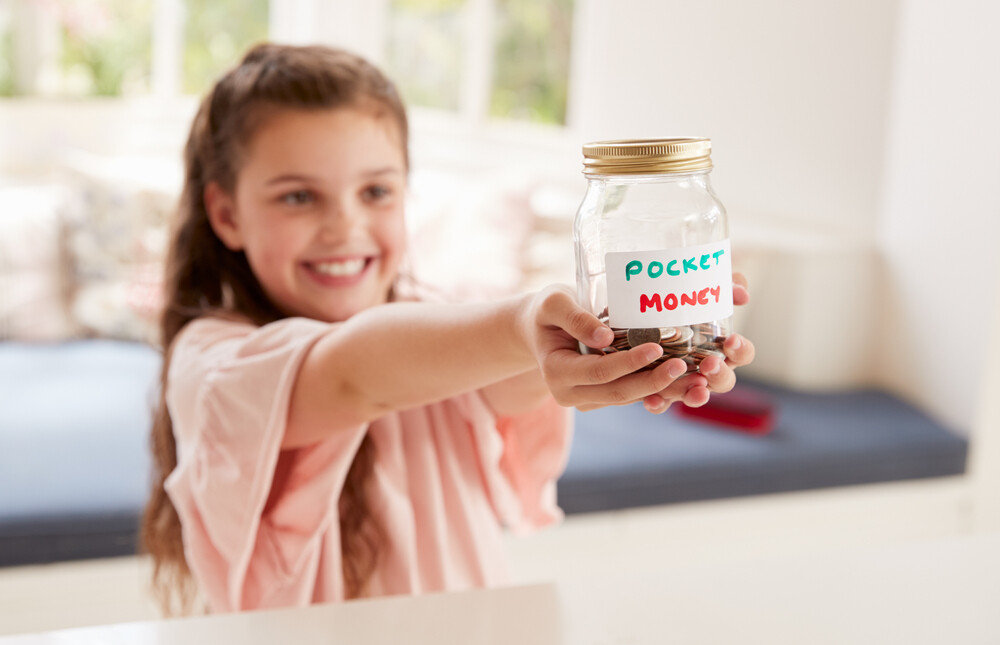From when should children receive pocket money? And how much is appropriate? That’s the recommendation of Child Protective Services.
Do small children already need their own money? Actually, of course not. Mum and Dad pay for everything they need to live and have fun.
Pocket money trained for life
Nevertheless, it makes sense to give children pocket money as early as possible so that they learn how to handle money – and also practice numbers and arithmetic.
Pocket money also teaches children the value of things and how to make decisions. “Do I buy ice cream every day or do I save my money for a cool toy?” The child has to decide for himself what is important to him and practises setting priorities and discipline.
How much pocket money should I give my child?
The parents or guardians are of course free to decide on the amount of pocket money. It depends not least on the financial possibilities. The general rule is: Do not exaggerate. Too much money overtaxes the children and the educational benefit is quickly lost.
If you are unsure, you can use the pocket money recommendations of the youth welfare offices as a guide. In the clearly arranged pocket money table you can see from which age children should be given pocket money and which amount is appropriate depending on their age.
Pocket money table of the youth welfare offices
| Age of the child | Level of pocket money |
| 4 to 5 years | 50 cents a week |
| 6 to 7 years | 1,50 Euro to 2 Euro per week |
| 8 to 9 years | 2 to 3 Euro per week |
| 10 to 11 years | 13 to 16 Euro per month |
| 12 to 13 years | 20 to 22 Euro per month |
| 14 to 15 years | 25 to 30 Euro per month |
| 16 to 17 years | 35 to 45 Euro per month |
| 18 years | 70 Euro per month |
In primary school still weekly payout
As you can see from the pocket money table, children of primary school age should still receive the money weekly. Only from the age of ten can they have a full month’s worth of pocket money and divide it up accordingly, according to educationalists.
Sensible rules for the payment of pocket money
- Set a regular date for payment and try not to forget it.
- Give the child the money voluntarily, so don’t make him beg for it.
- Do not attach conditions to the allowance. So don’t use it as a punishment by reducing it or cancelling it altogether. Also, do not use the pocket money as a reward for work or good grades, but rather give such payments separately. “The pocket money is a means of education for the child’s handling of money, but not a means of upbringing,” is the guiding principle of the School Psychology Service in St. Gallen.
- Talk to the child about how it should handle money, but without being too moral. Pocket money is actually also learning money. And it trains personal responsibility.
- Do not give the child an advance or credit. Otherwise the child will get used to living beyond its means at an early age and runs the risk of getting into debt later on.
Tip: Discuss the pocket money amount with other parents
“But Paul gets much more pocket money than me!” Situations like that happen naturally. To avoid envy and frustration, you can arrange with the parents of your children’s friends and agree on a similar amount.
On the other hand: The child will always encounter financial and social differences in life. Therefore it does no harm if it learns early on to accept and endure these differences. Talk to him or her about this and explain why you have decided on the pocket money.
What can the child buy with the pocket money?
In fact, it is actually allowed to determine that itself. According to the so-called pocket money paragraph, which can even be found in the Civil Code (paragraph 110), the voluntary payment of money by parents is regarded as consent that they may spend the money on things of relatively low value themselves. This means that the parents do not have to stand next to the child in the shop and give their “Go”, but the dealer is allowed to sell the child his sticky notes directly.
The situation is different with expensive things, for example bicycles, where parents can cancel the contract. And if the parents have expressly forbidden the purchase of certain things, the child must abide by them.
So: Discuss with the child beforehand what he or she is allowed to buy and what not. If you think that Star Wars collectible pictures are morally reprehensible, then forbid it, but still leave enough room for decision. No child enjoys an allowance that only allows them to buy fruit and vegetables.
Pocket money directly into the account?
When the children reach puberty, you can also think about a current account (without overdraft) or savings account to which you can transfer pocket money directly. In this way, the teenager also learns how to deal with banks and virtual money sensibly.
At this age, the children can also start taking on small jobs to supplement their pocket money.

